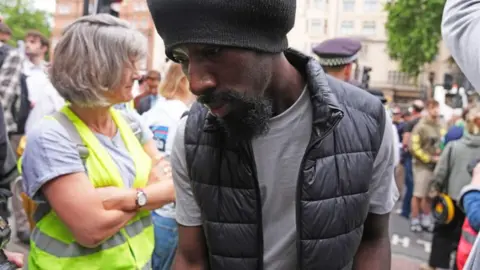In a recent court session, the sentencing of Charles Brohiri, a man caught evading train fares on 113 occasions, was postponed due to procedural concerns raised by the presiding judge. This legal development emerged from the Westminster Magistrates’ Court, where it was revealed that Brohiri has accrued over £30,000 in penalty fares, a staggering amount resulting from his recurrent violations of rail travel regulations.
During the proceedings, it became evident that Brohiri’s disputes with the law were not just limited to previous infractions. Despite already having a substantial number of offences attributed to him, he was reported to have incurred 30 new violations since his last court appearance in May. Just two days prior to the court hearing, he received another penalty fare. The district judge, showing concern over the legal process, decided to adjourn the sentencing to December, indicating that the validity of the prosecutor’s standing in this matter needed further review.
This case has put a spotlight on the use of lay prosecutors by rail companies, including Govia Thameslink, which has faced scrutiny over its legal practices. Lay prosecutors, who are not formally trained in law, have been employed by these companies to press charges against fare evaders. Recently, the Department for Transport cautioned that it is a “criminal offence” for such non-lawyers to represent rail operators in cases involving improper ticket purchases.
In a letter addressed to transport firms, the Transport Secretary, Heidi Alexander, explicitly stated that the use of lay prosecutors should not occur until companies can ensure that their practices are lawful and appropriate. The issues surrounding the prosecution of fare evaders, especially honest mistakes made by passengers, have become increasingly contentious. It appears that the situation with Charles Brohiri may serve as a critical case study in this ongoing discussion regarding the rail industry’s prosecution practices.
The district judge overseeing Brohiri’s case, John Zani, highlighted the necessity of a thorough review of whether the initial proceedings initiated against Brohiri, which utilized a lay prosecutor, were indeed valid. As concerns regarding the proper legal frameworks employed by rail companies grow, this case could pave the way for more stringent regulations governing the prosecution of fare evaders.
The ramifications of these developments mean that Brohiri will remain out of custody until a more detailed inquiry into his case is conducted. The court has scheduled a new hearing on December 16, where his legal representation will come into play. District Judge Zani mandated that Brohiri should refrain from boarding or attempting to access any train services operated by Govia Thameslink, underlining the seriousness of his legal troubles.
In conclusion, this evolving situation casts a critical eye on the practices employed by rail companies concerning fare evasion. As more details come to light and Brohiri’s case continues to unfold, it has the potential to instigate significant changes in how rail companies enforce fare compliance and prosecute offenders. The legal community and rail industry are watching closely as this case may shape future regulations, ensuring that the rights of passengers are protected while also addressing the issues of fare evasion effectively.











